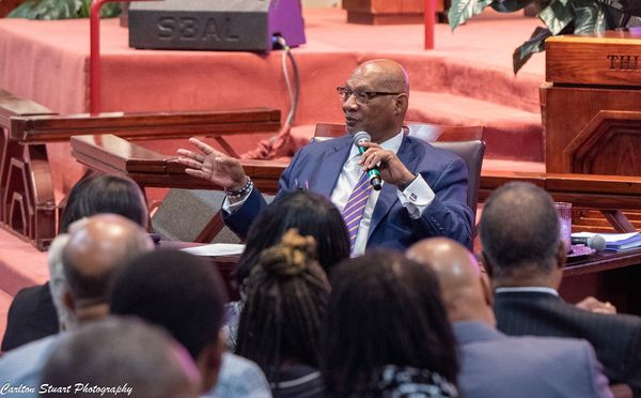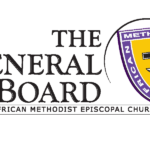By Rev. Justin Nick, TCR News Editor
On September 6, 2024, at 10 a.m., the Second Episcopal District gathered in mass at Ebenezer “The Beautiful” African Methodist Episcopal Church in Fort Washington, Maryland, where the Rev. Dr. Grainger Browning and the Rev. Dr. Jo Ann Browning served as hosts. Nearly one thousand clergy and lay from four states and the District of Columbia waited to hear from the new bishop. The strength of the district showed as presiding elders, pastors, leaders of the Women’s Missionary Society, Lay Organization, Women In Ministry, Sons of Allen, Richard Allen Young Adult Council, and Young People’s Division gathered.
The day was opened in spirited praise by gospel legend Byron Cage singing his hit song, “The Presence of the Lord is Here.” Energized by the ministry of music, the district rose to receive the 132nd Consecrated and Elected Bishop of The African Methodist Episcopal Church, Bishop Reginald Thomas Jackson. The Reverend William H. Lamar, IV, pastor of Metropolitan AME, explained that the Second Episcopal District has a history of disrupting injustice and that Bishop Jackson is the bishop that God has sent us to “guard our souls, defend the faith, and to make sure the nation pivots in the right direction.”
Bishop Jackson expeditiously got to work pivoting the district by encouraging the district to be its best and do its best as a ministry unto God. Bishop commented that he firmly believed the church must take leadership in the community and that nothing for the advancement of Black people had taken place without the church’s help. Bishop Jackson declared that “the same hand that used to pick cotton can now pick the president of the United States” if the district gets out to vote in the upcoming elections. After his remarks, Bishop Jackson introduced County Executive Angela Alsobrooks, senatorial candidate for Maryland. He highlighted the importance of the senatorial race in Maryland and the gubernatorial race in North Carolina.
County Executive Alsobrooks addressed the district with an assurance that she is a follower of Christ and tied to the AME Church through Ebenezer AME Church, which she joined at age 14. Quoting Senator Cory Booker, Country Executive Alsobrooks, highlighted that she pressed her way to the meeting because “it is malpractice to do any politics without seeking the help of Bishop Jackson.” Maryland’s senatorial race will determine which party holds the majority in the Senate. Alsobrooks lamented the acts of Jaylen Rushawn Prince in the Baltimore school shooting and commented that if her opponent wins, that means the National Rifle Association (NRA) wins. Alsobrooks also underscored that “the number one killer of children is gun violence…and we can do something about it.”
Following County Executive Alsobrooks, Bishop Jackson pivoted the district to be its best again by encouraging every church in the district to appoint a Get-Out-To-Vote Committee whose sole purpose is to register every eligible voter in the church and develop a plan to vote. Bishop Jackson mentioned that when he got to Georgia, he was upset with black people in the state of Georgia and that over 50 percent of black voters in Georgia did not vote. Registering is not enough; there must also be a plan to vote because people are registering and still not voting. Bishop Jackson stressed the conservatives’ efforts through Georgia Bill SB202, which reduced the number of drop boxes in marginalized communities and increased restrictions on absentee ballots. Thus, the district must mobilize to vote early so that if anything is wrong, voters can fix it and vote again.
Finally, Bishop Jackson pivoted the church to address the number one problem he identified about our churches: they are not growing. Bishop Jackson brought to the forefront of the district that the Black church was only replacing people who had either died or left the church. Evangelism is no longer one of the church’s goals, and 80 percent of members of local churches have never invited anyone to church. Bishop Jackson’s statistical articulations called for the district to be better in the number one job of the church, making disciples of Christ.
Bishop Jackson proposes that the district can “be the church at its best” in this quadrennium through these pivots. Bishop Jackson expounded that the church at its best “is when the church is scattered in their community, making an impact in their neighborhoods.” The church should be able to answer the question, “What difference would it make if the church closed down?”
After the meeting, members left Ebenezer with the assurance that the district was in good hands and pivoting in the right direction to “the church at its best.” The district received Bishop Jackson’s plan with high commendations, and many commented, “We’ve never seen it on this order before.” By the work of our hands and through the impartation of the divine’s spirit, The Second Episcopal District will be The Church At Its Best.





